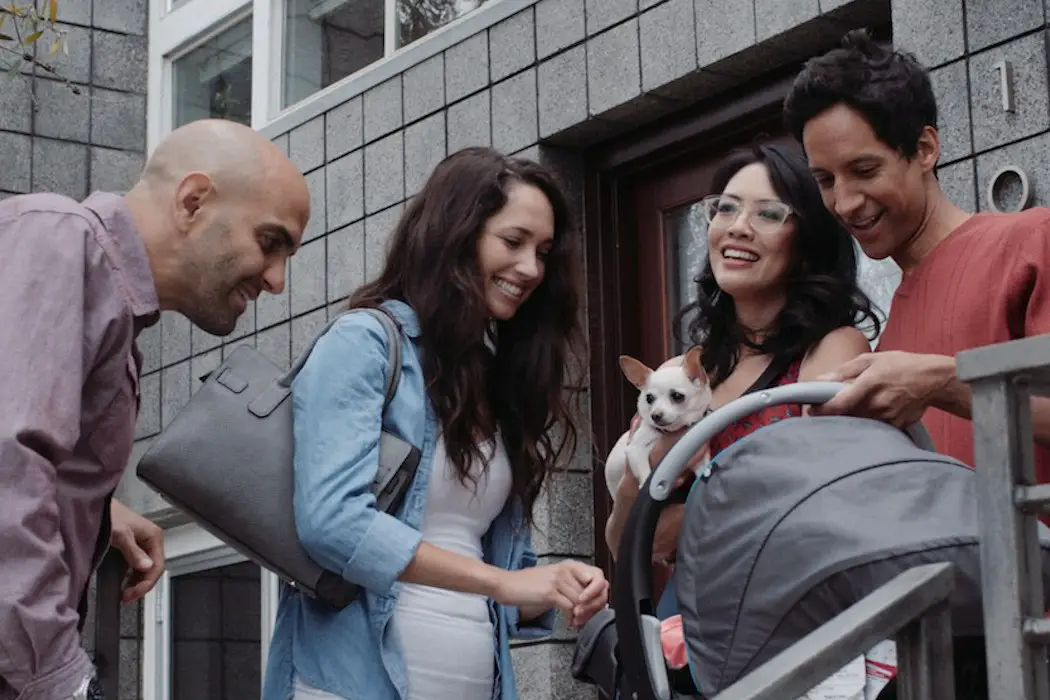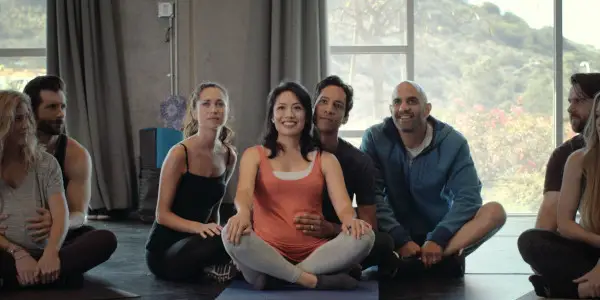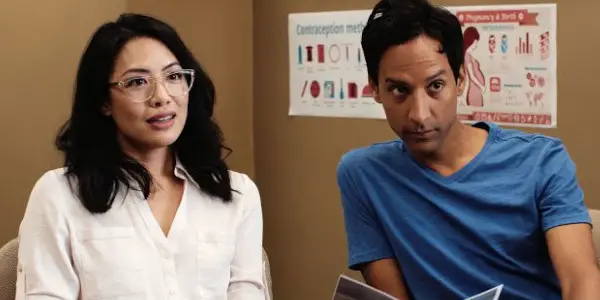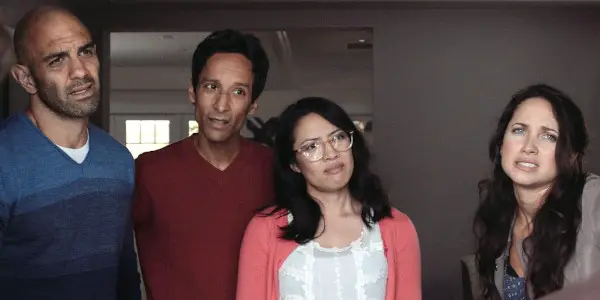Interview with Danny Pudi, Star of BABYSPLITTERS

Luke Parker is an award-winning film critic and columnist based…
Friends will sometimes split a check at a restaurant, but only at a bar can four people decide to split a baby. At least, that’s the premise behind Sam Friedlander‘s Babysplitters, a sweet-spirited couple comedy where indecision and spontaneity cross paths with one of life’s greatest challenges: starting a family.
And a challenge it most certainly is. For years, Jeff (Danny Pudi) and Sarah (Emily Chang) have watched their friends be swallowed up by the burdens of parenthood. Jeff, who treasures his day-to-day process, is hardly prepared to handle a kid on his own. So when he and his wife go on a double date with another young, childless couple (Maiara Walsh and Eddie Alfano), Jeff proposes that the four literally split the responsibilities of parenting. From there, as you can imagine, once their friends don’t seem totally disgusted by the idea, chaos ensues.
Film Inquiry recently had the pleasure of speaking to Danny Pudi about his experiences working on the film, as well as his approach to eccentric characters and his appreciation for ensemble comedy.
Luke Parker for Film Inquiry: There are a lot of unconventional things going on with these characters and especially under the roofs they’re trying to build. As a father yourself reading the script, what was racing through your mind going over these character’s plans?
Danny Pudi: As soon as I read the script, I responded to it because I had recently gone through becoming a new parent and some of the fears and anxieties [that came with it]. I was working as an artist here in Los Angeles, away from my family in Chicago, and not having a large support system around us – me and my wife – there was some stress, some worry. Can we handle this all on our own, being parents?

I guess trying to make optimal circumstances for parenting was something I definitely related to. I think through the course of the film, we talk about how parenting is all about compromise and how you’re never going to be ready. But for me, [the script] was definitely something I responded to after becoming a new dad because your world does change. There are some parts of you that you lose – in terms of your independence and what you do in your free time – that I wanted to explore, and I think that Sam does a good job talking about all those feelings you have when you become a new parent.
We can call this splitting idea unconventional, but one thing the film never doubts is the love these families would bring to the table for their child. While I’ve never really heard of a family unit quite like this – and that may very well be part of the point – what, in your mind, is the benefit of telling this chosen family story? There’s a lot of diversity in this movie and I think, a lot of progressive ideas about parenting.
Danny Pudi: Sam, the director, did a really great job exploring all these ideas that you have about parenting and how there are multiple different ways to raise children; there are a lot of different ways that families are being represented. And I think that was exciting for me. For an independent film with two Asian-American leads at the center of it, I think we were telling a story and just showing different sides of a family – what a family could look like.
This is definitely an extreme, unconventional family [chuckles], and ultimately, in our case, I don’t know if it would work, but I think there are some ideas here about coming together and really, choosing your family and all the people who contribute to it.
I wanted to talk about comedy for a second because this movie does have a lot of laughs to share, and many of them are thanks to you. But first of all, is it true that you took speed reading classes growing up?
Danny Pudi: [laughs] I did. I did, yeah.
That doesn’t surprise me at all because whenever I’m watching you – and it’s funny because I only just started watching Community a few weeks ago – I’m amazed at how accelerated, but controlled your delivery is. The same definitely goes for Jeff here in Babysplitters. When you’re preparing for a role and starting to mold a character, how much time do you spend considering the pace of the dialogue?
Danny Pudi: Oh wow, that’s a really great question. In terms of preparation for the character, pace and rhythm is something I think about a lot. I definitely think about that a lot.
For Jeff, he has this sort of planner mentality where he keeps crafting these plans that eventually spiral out of control. But in the film, we start to see how he’s constantly trying to get ahead of himself and really trying to create the perfect scenario for his wife and his friends. And I think he crafts some really good arguments.

So, for me, that was important when I was thinking about how he might speak and move around. I think he’s a confident person who is in his head quite a bit and because of that, some of these plans that he’s been living with might seem better [in his head] than they actually are. So in the movie, Jeff does come up with these situations and these arguments for his friends about why it might make sense to split a baby between four parents.
Because of that, I did think about this pace for him and a rhythm that is parallel to that.
Why do you think dialect is so important to the formation and individuality of a character?
Danny Pudi: I think that, if anything, people speak differently. People have different rhythms and for me, that’s one of the first ways I can connect with the character I’m playing. Physically, I try to imagine how i might walk as this person and I also imagine how I might speak as this person. I think Jeff has this false sense of security – which may present itself as this overconfidence and this speed and control with the way he communicates. So I think that was something that was fun for me to play and try.
In terms of comedy as well, that’s really fun to play. The root of it is this foursome and each one of us brings a different energy to the table. And I thought it was fun to have Jeff at the center with this neurotic, speedy pace that was balanced perfectly by Emily Chang and her more grounded pace.
I appreciate the fact that you’ve worked with Sam on both of his directorial features. What have you taken away from him, having watched him evolve as a filmmaker?
Danny Pudi: Great question. I did work with Sam on Larry Gaye and so, when he sent me this script to me, I responded to it immediately. He actually sent it to me with another character in mind, but when I read it, I really connected with Jeff because I just became a parent myself. So we had an open conversation about that and immediately he said, “let’s look into you playing that role.”
He’s really easy to communicate with. On set as well, we were approaching new scenes in a way that was very organic between us and also just having fun with it. We added layers of our own lives into the film, which was really great. And I believe Sam was becoming a new parent during the course of this film too, so it was nice for both of us to come to this film and its [questions about parenting] from two different perspectives.

I think Sam also strikes a nice balance of high concept but keeping it really grounded. And that’s something I’m always very interested in; I love physical comedy but I also love really grounded, emotional scenes that sit alongside it.
I did want to mention your own directorial debut, the 30 for 30 short, Untucked. Something I appreciated about that story was the fact that the team’s creative environment helped lead them to victory – and given your background in comedy and improv, I wanted to know what you think a loose, encouraging and creative set does for a film?
Danny Pudi: I think that’s something I’m very interested in. I study at The Second City and when I heard this story about a team that was allowed to design their own basketball jerseys, that was something that immediately got my attention. We hear about so many restrictive environments but this was different. They were an outlier. They were allowed to create internally in different ways, not just on the basketball court.
And I always thought about how beneficial that would be as a human in many environments. We hear about coaches who allow players to bring in suggested reading lists or do presentations on art. I think about how, as humans, we’re multi-faceted and I think about how being seen as a person, being seen as a whole person, really helps.
In terms of comedy and being on set, all the different ways that you can create an environment that is fun, that allows everyone to collaborate, to suggest and be open, and still having someone at the top who is leading and guiding, can only help the creative process. That can only help any team endeavor.
So that is something that’s very interesting to me. And I think it’s part of the reason why I love ensemble comedy: when people come to the same problem from different points-of-view, I always feel like you can get to something that’s much funnier.
Film Inquiry thanks Danny Pudi for his time.
Babysplitters is available to stream now on Amazon Prime, YouTube, and the Google Play Store.
Watch Babysplitters
Does content like this matter to you?
Become a Member and support film journalism. Unlock access to all of Film Inquiry`s great articles. Join a community of like-minded readers who are passionate about cinema - get access to our private members Network, give back to independent filmmakers, and more.
Luke Parker is an award-winning film critic and columnist based in the Baltimore-Washington metropolitan area. As an entertainment journalist, he has interviewed several members of the film industry and participated in some of its most prestigious events as a member of the press. Currently, he is working to obtain his bachelor’s degree in Mass Communication at Towson University.













